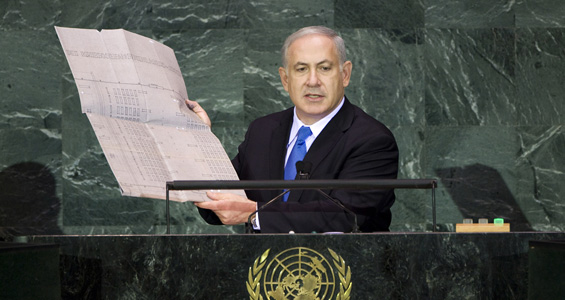Netanyahu ‘speaks like a conqueror’
Former Arab League diplomat says Israel should acknowledge that it is an occupying power.

 |
| Binyamin Netanyahu, the Israeli prime minister, addresses the UN General Assembly holding what he said were Nazi plans for the Auschwitz concentration camp [GALLO/GETTY] |
The first speech by Barack Obama, the US president, to the UN General Assembly reflects his profound awareness of the problems and deep anxieties felt by many around the world.
It is with such expressions of genuine empathy that the US president promised to empower the UN and, more importantly, uphold international law as the incubator of solutions which blend peace with justice.
But how Obama will apply this re-energised US commitment to the declared objective of a two-state solution for Israel and Palestine remains unclear.
Obama outlined his vision: “Two states living side-by-side in peace and security – a Jewish state of Israel with true security for all Israelis; and a viable, independent Palestinian state with contiguous territory that ends the occupation that began in 1967 and realises the potential of the Palestinian people.”
This statement encapsulates the objectives that the US president hopes to achieve. It is definitely a recognition that settlements are what the UN has repeatedly declared them to be – illegal.
Settlement proliferation
| in depth | |||||||||||||
|
The question that remains, however, is why all Israeli governments since 1967 pursued a policy of proliferating settlements, built the “separation wall” inside the occupied West Bank (declared illegal by the International Court of Justice), and built a network of roads exclusively for Jewish settlements.
All this is in addition to the continued, creeping annexation of occupied East Jerusalem.
The answer is that Israel since June 5, 1967 never – yes, never – acknowledged that it existed as an occupying power in the West Bank, Gaza, and East Jerusalem; instead, it has thus acted as a claimant of these territories as part of Israel.
It is this position which explains Israel’s ongoing policy of creating new facts on the ground and seeking to force both the member states of the United Nations and the Palestinian people to accept a fait accompli.
Israeli Prime Minister Binyamin Netanyahu’s repeated emphasis that settlements “should be left to the final phase of the negotiations” is explained by the fact that Israel does not view itself as an occupier.
Furthermore in his “blitz” on US TV channels, the Israeli prime minister emphasised that negotiations would not start until the Palestine Liberation Organisation (PLO) recognised Israel not only as a Jewish state but also a nation-state for the Jews.
Such a move would in turn render the Right of Return for more than a million Palestinian refugees totally inoperative, and the Israeli “Law of Return” disenfranchises further the Arab citizens of Israel.
Netanyahu’s conditions would be a de facto continuing of the institutional discrimination against Arabs
Netanyahu’s gambit
 |
| Maksoud says Netanyahu, left, pressured Obama during interviews on US networks [AFP] |
Netanyahu’s US media blitz was intended and continues to blunt the limited demand of the US president to freeze settlements.
But it was also designed to force Obama into a situation where he felt compelled during his UN speech to state and emphasise that the US “does not accept the legitimacy of continued Israeli settlements”.
It is my view that the US should also insist that Israel acknowledge its status as an occupying power.
Until such a time that Israel admits its status as an occupier, the “road map” becomes a road without a map. This in turn renders meaningless the aim of the two-state solution envisaged by Obama and by the 2002 Arab League Summit plan endorsed in Beirut.
But Obama may have also erred when he called on Palestinians “to end incitement against Israel,” because he is thereby ignoring the fact that resistance to occupation is a recognised and legal right.
The Palestinians have always prioritised civil disobedience, popular demonstrations and resorting to world public opinion, seeking UN support and a global commitment to the Palestinian national and human rights.
But these options have been tried several times and rendered inconsequential by US vetoes.
Confronting a conqueror
It became clear to the Palestinians that they were not resisting an occupation, but confronting a conqueror with the power to annex, to suppress, to render the concept of a Palestinian state devoid of any aspect or manifestation of sovereignty.
This realisation led to a sense of collective Palestinian humiliation.
As an African-American, Obama understands the voices of the humiliated, frustrated and almost hopeless communities in his country. The civil rights movement, thankfully, resolved many of these frustrations and did away with the humiliations.
However, these remain unresolved in Palestine and many parts of the world.
Obama’s opening to possible dialogue is an opportunity for the Arabs to unite, so their narrative becomes coherent and persuading world opinion that the justice of their cause and the legitimacy of their aspirations and rights becomes a human act of moral engagement.
Clovis Maksoud served as the chief representative of the Arab League in the United States and the United Nations until 1990. He is currently the director of the American University Center for Global South.
The views expressed in this article are the author’s own and do not necessarily reflect Al Jazeera’s editorial policy.
